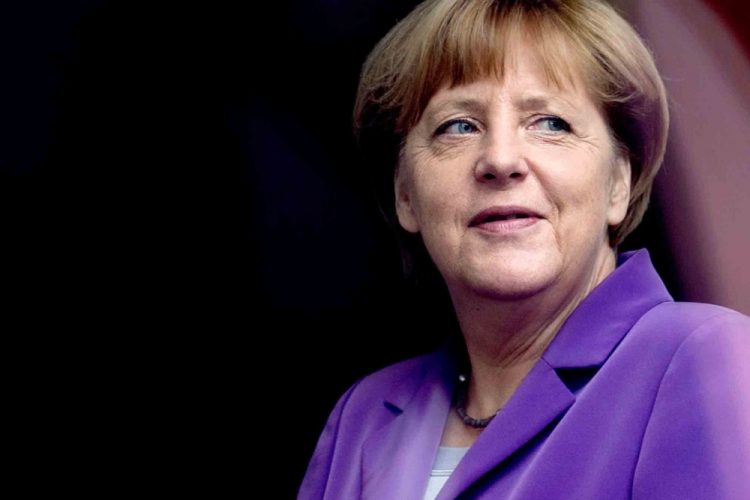Germany : Merkel says she will seek 4th term as chancellor

BERLIN : Angela Merkel announced on Sunday she wants to run for a fourth term as German chancellor in next year’s election, a sign of stability after Britain’s vote to leave the European Union and the election of Donald Trump as the next U.S. president.
The 62-year old conservative, facing a voter backlash over her open-door migrant policy, said she had thought long and hard before eventually deciding to stand again in the September election, ending months of speculation over her decision.
“The decision for a fourth term is – after 11 years in office – anything but trivial – for the country, the party and, I say it consciously in this order, for me personally,” she told reporters, striking a serious, almost somber, tone.
“It is a decision not just for an election campaign but about the next four years … if health allows it,” she added after a meeting of senior members of her conservative Christian Democrat (CDU) party.
An Emnid poll on Sunday showed that some 55 percent of Germans want Merkel, Germany’s eighth chancellor since World War Two, to serve a fourth term, with 39 percent against, indicating that despite setbacks, she is still an electoral asset.
Merkel has steered Europe’s biggest economy through the financial crisis and euro zone debt crisis and has won respect internationally, for example with her efforts to help solve the conflict in Ukraine. U.S. President Barack Obama last week described her as an “outstanding” ally.
With Trump’s victory in the United States and the rise in support for right-wing parties in several European states, some commentators see Merkel as a bastion of Western liberal values.
“Angela Merkel is the answer to the populism of this time. She is, as it were, the anti-Trump,” party ally Stanislaw Tillich, premier of the state of Saxony, told the RND newspaper group, adding she stood for reliability and predictability.
However, she rejected the responsibility that was pushed onto her after Trump’s win as “grotesque and absurd”.
“No person alone – even with the greatest experience – can change things in Germany, Europe and the world for the better, and certainly not the chancellor of Germany,” she said.
Merkel’s decision last year to open Germany’s borders to around 900,000 migrants, mostly from war zones in the Middle East, angered many voters at home and dented her ratings.
Her party has slumped in regional elections in the last year while support for the anti-immigrant Alternative for Germany (AfD) has swelled.
In September, after a heavy defeat for the CDU in a Berlin state election, a humbled Merkel surprised the country by saying she wished she could turn the clock back on the migrant crisis, though she stopped short of saying her policy was a mistake.
Domestically, her biggest challenge will probably be managing the integration of refugees in an increasingly divided society and keeping Europe’s powerhouse economy on track.
“On a European and international level we have to stand up for our values and interests,” she said, citing the euro zone crisis, the migrant crisis and Brexit as challenges.
An Emnid poll on Sunday put Merkel’s conservative bloc down one point at 33 percent, nine points ahead of her nearest rivals, the Social Democrats (SPD), with whom she shares power.
In a system where coalition governments are the norm, many pollsters see another ‘grand coalition’ as the most likely option after the election, although the rise of the AfD makes coalition arithmetic more complicated.
The SPD has not decided whether its chairman Sigmar Gabriel, Vice Chancellor and Economy Minister, will run against Merkel.
One of the SPD’s deputy leaders, Ralf Stegner, said it would be a mistake to underestimate Merkel but that the “myth of invincibility” was over.
Merkel said this election would be more difficult than any since reunification in 1990 due to the threat from the right, social divisions and the possibility that Germany’s leftist parties could form a coalition.
Merkel, who grew up in Communist East Germany, is a physicist who only became involved in politics after the fall of the Berlin Wall in 1989. She is seen as a talented negotiator but has also shown a ruthless streak.
A Protestant woman in a mainly Catholic and male-dominated party, at least when she became its leader in 2000, Merkel never built up a regional power base but over the years she has sidelined her main male rivals and has no obvious successor.
She still requires the official backing of her party at a conference in early December and also of her Christian Social Union (CSU) allies in Bavaria, who have fiercely criticized her open-door migrant policy. CSU head Horst Seehofer welcomed her decision on Sunday.
“We now want the trust of the population for another four years and therefore it is good that we have clarity,” he said.
Germany has no limit on the number of terms a chancellor can serve and Merkel could end up matching the 16 years in office of her former mentor, Helmut Kohl. It was Merkel herself who broke with Kohl and told her party in 1999, in the midst of a funding scandal, that it should move on without him.
